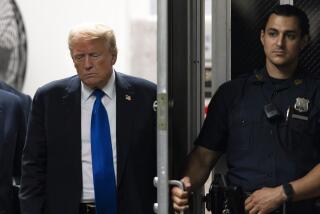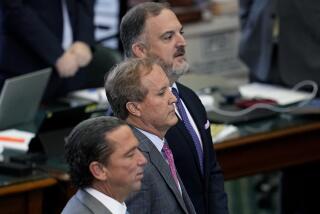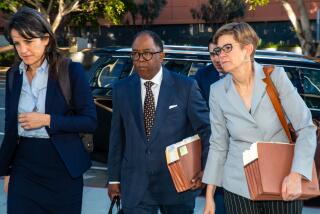Focus Is on Entrapment Issue as Tucker Case Goes to Jury : Courts: Prosecution says he sold his vote for cash. Defense says ‘overzealous’ government ‘tried to destroy this young man’s life.’ Deliberation starts Nov. 28.
- Share via
The federal extortion and tax fraud case against Rep. Walter R. Tucker III went to the jury Friday with the issue of entrapment dominating closing arguments.
In his final remarks, Assistant U.S. Atty. Steven G. Madison told jurors that the case against the 38-year-old congressman came down to one basic issue:
“Is he the corrupt politician he appears to be, selling his vote for cash and victimizing his constituency, or is he, as he claims, the victim of some massive government conspiracy, some phenomenal series of plots, all aimed at attacking Walter Tucker?”
*
After receiving instructions from U.S. District Judge Consuelo B. Marshall, the jury was sent home. Because of personal commitments of some jurors, the panel will not begin deliberations until Nov. 28.
Tucker is charged with extorting $37,500 and soliciting an additional $250,000 in bribes from two businesses while serving as mayor of Compton in 1991 and 1992. He also is accused of income tax fraud.
Most of the payments were captured by hidden video cameras and microphones in offices used by FBI informant John Macardican and Robert Kilbane, an undercover FBI agent who was posing as Macardican’s financier.
Macardican, who was seeking local government approval to construct a $250-million waste conversion plant in Compton, also wore a body recorder during his meetings with Tucker.
In his closing argument to the jurors, defense attorney Robert Ramsey Jr. portrayed Macardican as a liar who entrapped Tucker.
“We’re not saying Mr. Macardican did these things by himself,” he said. “He acted under the instructions of an overzealous government that tried to destroy this young man’s life.”
Reading from a transcript of Tucker’s first meeting with Macardican, Ramsey rebutted prosecution arguments that Tucker solicited a bribe. A careful reading, Ramsey told the jurors, shows that Macardican finessed the conversation from innocent talk about campaign contributions to a discussion of making payments in “green” so they could not be traced.
*
“Mr. Tucker never meant anything sinister or illegal,” Ramsey said. “He meant campaign contributions. What was in Mr. Macardican’s mind he didn’t know. Was Mr. Tucker supposed to know he was talking about bribery? This was the first time they had ever met.”
In addition to the defense theory of entrapment, Ramsey offered the jury another basis for acquitting the two-term Democratic legislator. He said the government failed to show that Tucker promised to perform any official act as mayor in return for the money from Macardican.
*
“How can anyone say this defendant didn’t know he was selling his vote?” responded Madison, urging the jury to replay the videotapes and observe Tucker’s demeanor and his responses when told he was being paid for his vote.
The prosecutor said Tucker understood exactly what was being discussed and clearly indicated his agreement.
As for Ramsey’s argument that Tucker was manipulated by Macardican, Madison observed that Tucker was a trained lawyer, a former prosecutor and a mayor who had met with the President of the United States. “And suddenly, he becomes putty in the hands of a trash man from El Monte?”
Madison denied that the FBI had plotted to get Tucker, adding that he “walked into” an ongoing investigation of corruption in Compton that had begun at least a year before Tucker was elected to public office. In addition to the $30,000 he allegedly extorted from Macardican, Tucker is accused of soliciting a $250,000 bribe from Kilbane and extorting $7,500 from Murcole Disposal, Compton’s residential rubbish hauler.
More to Read
Sign up for Essential California
The most important California stories and recommendations in your inbox every morning.
You may occasionally receive promotional content from the Los Angeles Times.













